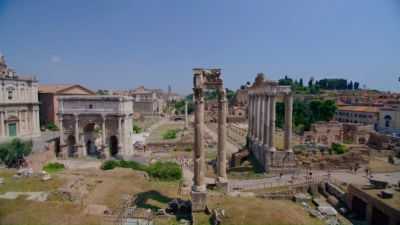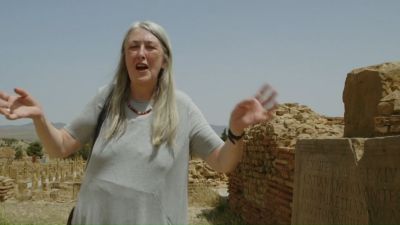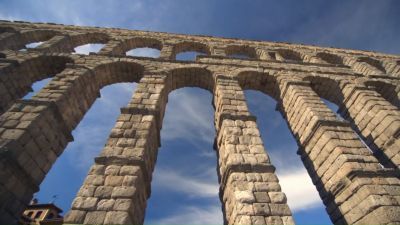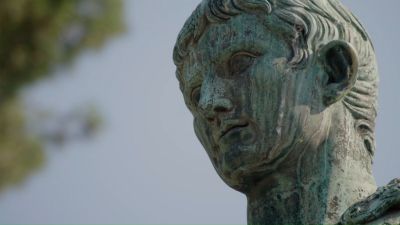The BEST episodes of Mary Beard's Ultimate Rome: Empire Without Limit season 1
Every episode of Mary Beard's Ultimate Rome: Empire Without Limit season 1, ranked from best to worst by thousands of votes from fans of the show. The best episodes of Mary Beard's Ultimate Rome: Empire Without Limit season 1!
Professor Mary Beard draws on her immense scholarship, unique viewpoints and myth-busting approach to Roman history, to give her definitive take on the Roman Empire. How and why did it happen? In search of answers, she takes us to the most telling sites and the most revealing artifacts, and she examines the legacy the Roman Empire has left behind.

#1 - Episode 4
Season 1 - Episode 4 - Aired 5/18/2016
In the fourth and final episode, Mary tackles the biggest puzzle of all: why, and how, did the Roman Empire fall? Surveying the massive walls and fortifications of Britain and Germany, she discovers an empire under pressure, struggling to control its borders. Mary seeks to redefine our understanding of the so-called 'Barbarian Invasions', but also shows that the Roman Empire was facing even greater challenges from within. Maverick emperors upset all the assumptions of right-thinking Romans, while the traditional religion and beliefs of the Roman state came head to head with the absolute conviction of Jews and Christians. Ultimately, Mary asks whether the Roman Empire was transformed rather than destroyed, and indeed lives on in the world we still see all around us - in our institutions and infrastructure, in the aspirations, methodology and symbolism of many empires since.
Watch Now:Amazon
#2 - Episode 3
Season 1 - Episode 3 - Aired 5/11/2016
In the third episode Mary takes an in-depth look at the question of identity and citizenship within the Roman Empire. What did it mean to be, or to become, Roman, and how did the very different parts of the empire react to Roman rule? In the beautifully preserved cities of Algeria, incomers and locals mixed to create flourishing communities with a distinct 'more Roman than Rome' frontier identity. Mary follows the trail of one such African Roman from his native land all the way to Britain, where he served as governor - proof that for all the brutality of conquest, there were opportunities too. Here in Britain another picture emerges, of resistance, hybrid culture and incipient British identity. In York and Newcastle, Mary finds the remains of Romans, but not as we might imagine them - a rich African lady, officers from central Europe and a camp follower from Syria.
Watch Now:Amazon
#3 - Episode 2
Season 1 - Episode 2 - Aired 5/4/2016
In the second episode, Mary Beard explores the physical world of the Roman Empire, and finds surprising parallels with our own world. Setting out in the footsteps of the emperor Hadrian, she discovers a vast empire bound together by a common material culture, and a globalised economy of such scale that evidence of its side-effects can still be seen today, thousands of miles away from Rome. Mary unpicks the threads of a huge commercial and cultural network, taking in the vital supply of olive oil to Rome and her armies, the slave trade, and the all-important silver mines of Spain. Following the famous Roman road network, and the shipping routes connecting the empire's thriving ports, Mary reveals another side to the Roman Empire, one where builders and traders eclipse soldiers, and starring slaves, not senators, making the most of a hugely connected new world.

#4 - Episode 1
Season 1 - Episode 1 - Aired 4/27/2016
In this first episode, Mary Beard reaches back to the myths and legends of the origins of Rome to gain an insight into the deep-rooted psyche of the people of Rome - a city born through fratricide and rape. But from the very beginning, Rome was also an asylum for outcasts and exiles and because of this, it adopted a uniquely inclusive approach towards its neighbours and defeated enemies. The expansion of the city brought territory in first in Italy and Sicily, where Rome first came head to head and eventually defeated her great rival, Carthage. Mary then travels to Greece, where Rome adopted a complex mix of brute force and cultural cringe, and France, where she finds evidence of war methods akin to outright genocide. In typical myth-busting style, Mary argues that the period of greatest Roman expansion occurred when Rome itself was little more than a provincial backwater, a shantytown of mud and brick. The marble, monumental Rome we know came about because of imperial conquest - not the other way round. And likewise, the creation and possession of an empire transformed the politics of Rome forever, creating the conditions for one-man rule, and ending the centuries-old Roman Republic.